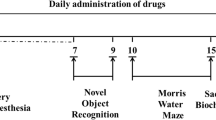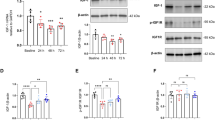Abstract
Post-operative cognitive dysfunction (POCD) is associated with elderly patients undergoing surgery. However, pharmacological treatments for POCD are limited. In this study, we found that curcumin, an active compound derived from Curcuma longa, ameliorated the cognitive dysfunction following abdominal surgery in aged mice. Further, curcumin prevented surgery-induced anti-oxidant enzyme activity. Curcumin also increased brain-derived neurotrophic factor (BDNF)-positive area and expression of pAkt in the brain, suggesting that curcumin activated BDNF signaling in aged mice. Furthermore, curcumin neutralized cholinergic dysfunction involving choline acetyltransferase expression induced by surgery. These results strongly suggested that curcumin prevented cognitive impairments via multiple targets, possibly by increasing the activity of anti-oxidant enzymes, activation of BDNF signaling, and neutralization of cholinergic dysfunction, concurrently. Based on these novel findings, curcumin might be a potential agent in POCD prophylaxis and treatment.






Similar content being viewed by others
Abbreviations
- BDNF:
-
brain-derived neurotrophic factor
- CAT:
-
catalase
- ChAT:
-
choline acetyltransferase
- GPx:
-
glutathione peroxidase
- IHC:
-
Immunohistochemical
- MWM:
-
Morris water maze
- NIH:
-
National Institutes of Health
- NOR:
-
Novel object recognition
- Nrf2:
-
Nuclear factor (erythroid-derived 2)-like 2
- OD:
-
optical density
- POCD:
-
post-operative cognitive
- SOD:
-
superoxide dismutase.
References
Bevins RA, Besheer J (2006) Object recognition in rats and mice: a one-trial non-matching-to-sample learning task to study 'recognition memory'. Nat Protoc 1:1306–1311
Bilotta F et al (2013) Pharmacological perioperative brain neuroprotection: a qualitative review of randomized clinical trials. Br J Anaesth 110(Suppl 1):i113–i120
Cui W et al (2014) Sunitinib produces neuroprotective effect via inhibiting nitric oxide overproduction. CNS Neurosci Ther 20:244–252
Deiner S, Silverstein JH (2009) Postoperative delirium and cognitive dysfunction. Br J Anaesth 103(Suppl 1):i41–i46
Dutzmann S et al (2016) Intratumoral concentrations and effects of orally administered micellar Curcuminoids in Glioblastoma patients. Nutr Cancer 68:943–948
Eckert GP et al (2013) Curcumin prevents mitochondrial dysfunction in the brain of the senescence-accelerated mouse-prone 8. Neurochem Int 62:595–602
Fan CD, et al. (2016a) Reversal of Beta-amyloid-induced neurotoxicity in PC12 cells by curcumin, the important role of ROS-mediated signaling and ERK pathway. Cell Mol Neurobiol
Fan D, Li J, Zheng B, Hua L, Zuo Z (2016b) Enriched environment attenuates surgery-induced impairment of learning, memory, and neurogenesis possibly by preserving BDNF expression. Mol Neurobiol 53:344–354
Fu XY et al (2016) Strategy to suppress oxidative damage-induced neurotoxicity in PC12 cells by curcumin: the role of ROS-mediated DNA damage and the MAPK and AKT pathways. Mol Neurobiol 53:369–378
Hagl S et al (2015) Curcumin micelles improve mitochondrial function in neuronal PC12 cells and brains of NMRI mice - impact on bioavailability. Neurochem Int 89:234–242
Hassanzadeh P, Hassanzadeh A (2012) The CB1 receptor-mediated Endocannabinoid signaling and NGF: the novel targets of curcumin. Neurochem Res 37:1112–1120
He XJ, Uchida K, Megumi C, Tsuge N, Nakayama H (2015) Dietary curcumin supplementation attenuates 1-methyl-4-phenyl-1,2,3,6-tetrahydropyridine (MPTP) neurotoxicity in C57BL mice. J Toxicol Pathol 28:197–206
Huang HC et al (2016) Antioxidative and neuroprotective effects of curcumin in an Alzheimer's disease rat model Co-treated with Intracerebroventricular streptozotocin and subcutaneous D-Galactose. J Alzheimers Dis 52:899–911
Jangra A et al (2016) Piperine augments the protective effect of curcumin against lipopolysaccharide-induced neurobehavioral and neurochemical deficits in mice. Inflammation 39:1025–1038
Jomezadeh V, Mohammadpour AH, Rajabi O, Tavassoli A, Maddah G (2012) Evaluation of curcumin effects on post-operative peritoneal adhesion in rats. Iran J Basic Med Sci 15:1162–1167
Kalb A et al (2013) Acetylcholinesterase inhibitors reduce neuroinflammation and -degeneration in the cortex and hippocampus of a surgery stress rat model. PLoS One 8:e62679
Kang ES et al (2007) Up-regulation of aldose reductase expression mediated by phosphatidylinositol 3-kinase/Akt and Nrf2 is involved in the protective effect of curcumin against oxidative damage. Free Radical Bio Med 43:535–545
Koga T, Bellier JP, Kimura H, Tooyama I (2013) Immunoreactivity for choline acetyltransferase of peripheral-type (pChAT) in the trigeminal ganglion neurons of the non-human primate Macaca fascicularis. Acta Histochem Cytoc 46:59–64
Kumar TP, Antony S, Gireesh G, George N, Paulose CS (2010) Curcumin modulates dopaminergic receptor, CREB and phospholipase c gene expression in the cerebral cortex and cerebellum of streptozotocin induced diabetic rats. J Biomed Sci 17
Mason SE, Noel-Storr A, Ritchie CW (2010) The impact of general and regional anesthesia on the incidence of post-operative cognitive dysfunction and post-operative delirium: a systematic review with meta-analysis. J Alzheimers Dis 22(Suppl 3):67–79
Metzler M, Pfeiffer E, Schulz SI, Dempe JS (2013) Curcumin uptake and metabolism. Biofactors 39:14–20
Millington C et al (2014) Chronic neuroinflammation in Alzheimer's disease: new perspectives on animal models and promising candidate drugs. Biomed Res Int 2014:309129
Monk TG et al (2008) Predictors of cognitive dysfunction after major noncardiac surgery. Anesthesiology 108:18–30
Morris R (1981) Spatial localization does not require the presence of local cues. Learn Motiv 2:239–260
Mulik RS, Monkkonen J, Juvonen RO, Mahadik KR, Paradkar AR (2012) ApoE3 mediated polymeric nanoparticles containing curcumin: apoptosis induced in vitro anticancer activity against neuroblastoma cells. Int J Pharmaceut 437:29–41
Nam SM et al (2014) Effects of curcumin (Curcuma longa) on learning and spatial memory as well as cell proliferation and neuroblast differentiation in adult and aged mice by Upregulating brain-derived neurotrophic factor and CREB signaling. J Med Food 17:641–649
Pu YF et al (2013) Dietary curcumin ameliorates aging-related cerebrovascular dysfunction through the AMPK/uncoupling protein 2 pathway. Cell Physiol Biochem 32:1167–1177
Ringman JM, Frautschy SA, Cole GM, Masterman DL, Cummings JL (2005) A potential role of the curry spice curcumin in Alzheimer's disease. Curr Alzheimer Res 2:131–136
Schiborr C, Eckert GP, Rimbach G, Frank J (2010) A validated method for the quantification of curcumin in plasma and brain tissue by fast narrow-bore high-performance liquid chromatography with fluorescence detection. Anal Bioanal Chem 397:1917–1925
Seo JS et al (2010) Severe motor neuron degeneration in the spinal cord of the Tg2576 mouse model of Alzheimer disease. J Alzheimers Dis 21:263–276
Shin SS, Dixon CE (2015) Alterations in cholinergic pathways and therapeutic strategies targeting cholinergic system after traumatic brain injury. J Neurotrauma 32:1429–1440
Tian XS et al (2015) Surgical stress induces brain-derived neurotrophic factor reduction and postoperative cognitive dysfunction via glucocorticoid receptor phosphorylation in aged mice. CNS Neurosci Ther 21:398–409
Tsai YM, Chien CF, Lin LC, Tsai TH (2011) Curcumin and its nano-formulation: the kinetics of tissue distribution and blood-brain barrier penetration. Int J Pharmaceut 416:331–338
Tvrda E, et al. (2016) Curcumin has protective and antioxidant properties on bull spermatozoa subjected to induced oxidative stress. Anim Reprod Sci
Wang HL, Liu H, Xue ZG, Liao QW, Fang H (2016a) Minocycline attenuates post-operative cognitive impairment in aged mice by inhibiting microglia activation. J Cell Mol Med
Wang HL, Liu H, Xue ZG, Liao QW, Fang H (2016b) Minocycline attenuates post-operative cognitive impairment in aged mice by inhibiting microglia activation. J Cell Mol Med 20:1632–1639
Wu JX et al (2013) Neuroprotection by curcumin in ischemic brain injury involves the Akt/Nrf2 pathway. PLoS One 8
Xie Y et al (2014) Curcumin ameliorates cognitive deficits heavy ion irradiation-induced learning and memory deficits through enhancing of Nrf2 antioxidant signaling pathways. Pharmacol Biochem Be 126:181–186
Xu ZP, et al. (2014) Age-dependent postoperative cognitive impairment and Alzheimer-related neuropathology in mice Sci Rep-Uk 4
Yu JJ, Pei LB, Zhang Y, Wen ZY, Yang JL (2015) Chronic supplementation of curcumin enhances the efficacy of antidepressants in major depressive disorder: a randomized, double-blind, placebo-controlled pilot study. J Clin Psychopharmacol 35:406–410
Yuan S et al (2014) The effects of electroacupuncture treatment on the postoperative cognitive function in aged rats with acute myocardial ischemia-reperfusion. Brain Res 1593:19–29
Zanette G, Micaglio M, Zanette L, Manani G, Facco E (2010) Comparison between ketamine and fentanyl-droperidol for rectal premedication in children: a randomized placebo controlled trial. J Anesth 24:197–203
Zhang L et al (2015a) Curcumin improves amyloid beta-peptide (1-42) induced spatial memory deficits through BDNF-ERK signaling pathway. PLoS One 10:e0131525
Zhang L, et al. (2015b) Curcumin Improves Amyloid beta-Peptide (1–42) Induced Spatial Memory Deficits through BDNF-ERK Signaling Pathway. Plos One 10
Zhang Z, Li X, Li F, An L (2016) Berberine alleviates postoperative cognitive dysfunction by suppressing neuroinflammation in aged mice. Int Immunopharmacol 38:426–433
Zhu XY, et al. (2014) Curcumin Alleviates Neuropathic Pain by Inhibiting p300/CBP Histone Acetyltransferase Activity-Regulated Expression of BDNF and Cox-2 in a Rat Model. Plos One 9
Acknowledgements
This work was supported by Ningbo Natural Science Foundation (2015A610219, 2013A610221), the National Natural Science Foundation of China (U1503223, 81673407), the Natural Science Foundation of Zhejiang Province (LY15H310007), the Applied Research Project on Nonprofit Technology of Zhejiang Province (2016C37110), Medicine and Drugs Research of Zhejiang Province (2014KYB232), the Ningbo International Science and Technology Cooperation Project (2014D10019), Ningbo municipal innovation team of life science and health (2015C110026), the Scientific Research Foundation for the Returned Overseas Chinese Scholars, the State Education Ministry, and the K. C. Wong Magna Fund in Ningbo University.
Author information
Authors and Affiliations
Corresponding authors
Additional information
Xiang Wu and Huixin Chen contribute equally as co-first authors.
Rights and permissions
About this article
Cite this article
Wu, X., Chen, H., Huang, C. et al. Curcumin attenuates surgery-induced cognitive dysfunction in aged mice. Metab Brain Dis 32, 789–798 (2017). https://doi.org/10.1007/s11011-017-9970-y
Received:
Accepted:
Published:
Issue Date:
DOI: https://doi.org/10.1007/s11011-017-9970-y




